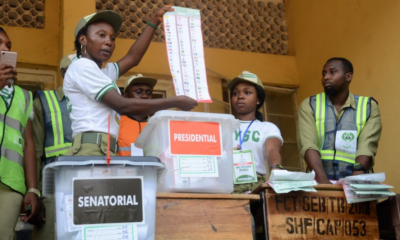TechNews
Sophos Introduces Sophos X-Ops
Sophos X-Ops links together SophosLabs, Sophos SecOps and Sophos AI, three established teams of cybersecurity experts at Sophos, to help organizations better defend against cyberattacks


Sophos, a global leader in next-generation cybersecurity, has announced Sophos X-Ops, a new cross-operational unit linking SophosLabs, Sophos SecOps and Sophos AI, three established teams of cybersecurity experts at Sophos, to help organizations better defend against constantly changing and increasingly complex cyberattacks.
Sophos X-Ops leverages the predictive, real-time, real-world, and deeply researched threat intelligence from each group, which, in turn, collaborate to deliver stronger, more innovative protection, detection and response capabilities.
Sophos today is also issuing “OODA: Sophos X-Ops Takes on Burgeoning SQL Server Attacks,” research about increased attacks against unpatched Microsoft SQL servers and how attackers used a fake downloading site and grey-market remote access tools to distribute multiple ransomware families.
Sophos X-Ops identified and thwarted the attacks because the Sophos X-Ops teams combined their respective knowledge of the incidents, jointly analyzed them, and took action to quickly contain and neutralize the adversaries.
“Modern cybersecurity is becoming a highly interactive team sport, and as the industry has matured, necessary analysis, engineering and investigative specializations have emerged. Scalable end-to-end operations now need to include software developers, automation engineers, malware analysts, reverse engineers, cloud infrastructure engineers, incident responders, data engineers and scientists, and numerous other experts, and they need an organizational structure that avoids silos,” said Joe Levy, chief technology and product officer, Sophos. “We’ve unified three globally recognized and mature teams within Sophos to provide this breadth of critical, subject matter and process expertise. Joined together as Sophos X-Ops, they can leverage the strengths of each other, including analysis of worldwide telemetry from more than 500,000 customers, industry-leading threat hunting, response and remediation capabilities, and rigorous artificial intelligence to measurably improve threat detection and response. Attackers are often too organized and too advanced to combat without the unique combined expertise and operational efficiency of a joint task force like Sophos X-Ops.”
Speaking in March 2022 to the Detroit Economic Club about the FBI partnering with the private sector to counter the cyber threat, FBI Director Christopher Wray said, “What partnership lets us do is hit our adversaries at every point, from the victims’ networks back all the way to the hackers’ own computers, because when it comes to the FBI’s cyber strategy, we know trying to stand in the goal and block shots isn’t going to get the job done.
“We’re disrupting three things: the threat actors, their infrastructure and their money. And we have the most durable impact when we work with all of our partners to disrupt all three together.” Sophos X-Ops is taking a similar approach: gathering and operating on threat intelligence from its own multidisciplinary groups to help stop attackers earlier, preventing or minimizing the harms of ransomware, espionage or other cybercrimes that can befall organizations of all types and sizes, and working with law enforcement to neutralize attacker infrastructure. While Sophos’ internal teams already share information as a matter of course, the formal creation of Sophos X-Ops drives forward a faster, more streamlined process necessary to counter equally fast-moving adversaries.
“Effective cybersecurity requires robust collaboration at all levels, both internally and externally; it is the only way to discover, analyze and counter malicious cyber actors at speed at scale. Combining these separate teams into Sophos X-Ops shows that Sophos understands this principle and is acting on it,” said Michael Daniel, president and CEO, Cyber Threat Alliance.
Sophos X-Ops also provides a stronger cross-operational foundation for innovation, an essential component of cybersecurity due to the aggressive advancements in organized cybercrime. By intertwining the expertise of each group, Sophos is pioneering the concept of an artificial intelligence (AI) assisted Security Operations Center (SOC), which anticipates the intentions of security analysts and provides relevant defensive actions. In the SOC of the future, Sophos believes this approach will dramatically accelerate security workflows and the ability to more quickly detect and respond to novel and priority indicators of compromise.
“The adversary community has figured out how to work together to commoditize certain parts of attacks while simultaneously creating new ways to evade detection and taking advantage of weaknesses in any software to mass exploit it. The Sophos X-Ops umbrella is a noted example of stealing a page from the cyber miscreants’ tactics by allowing cross-collaboration amongst different internal threat intelligence groups,” said Craig Robinson, IDC research vice president, Security Services. “Combining the ability to cut across a wide breadth of threat intelligence expertise with AI assisted features in the SOC allows organizations to better predict and prepare for imminent and future attacks.”
-



 GRPolitics3 days ago
GRPolitics3 days agoLet the People’s Voice Stand: A High‑Assertiveness Call to Democratic Integrity in the Digital Age
-



 Spotlight4 days ago
Spotlight4 days agoProphetic Outlook for 2026: Help Is on the Way
-



 GRPolitics4 days ago
GRPolitics4 days agoAmidst Atiku and Obi in ADC, Bola Ahmed Tinubu Retains a Significant Structural Advantage Ahead of the 2027 Election – A Data‑Driven Assessment
-



 Culture3 days ago
Culture3 days agoGovernor Mbah Visits Igwe Greg Ugwu, Enyi 1 of Attakwu, Nkanu West LGA








